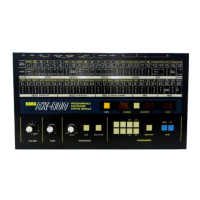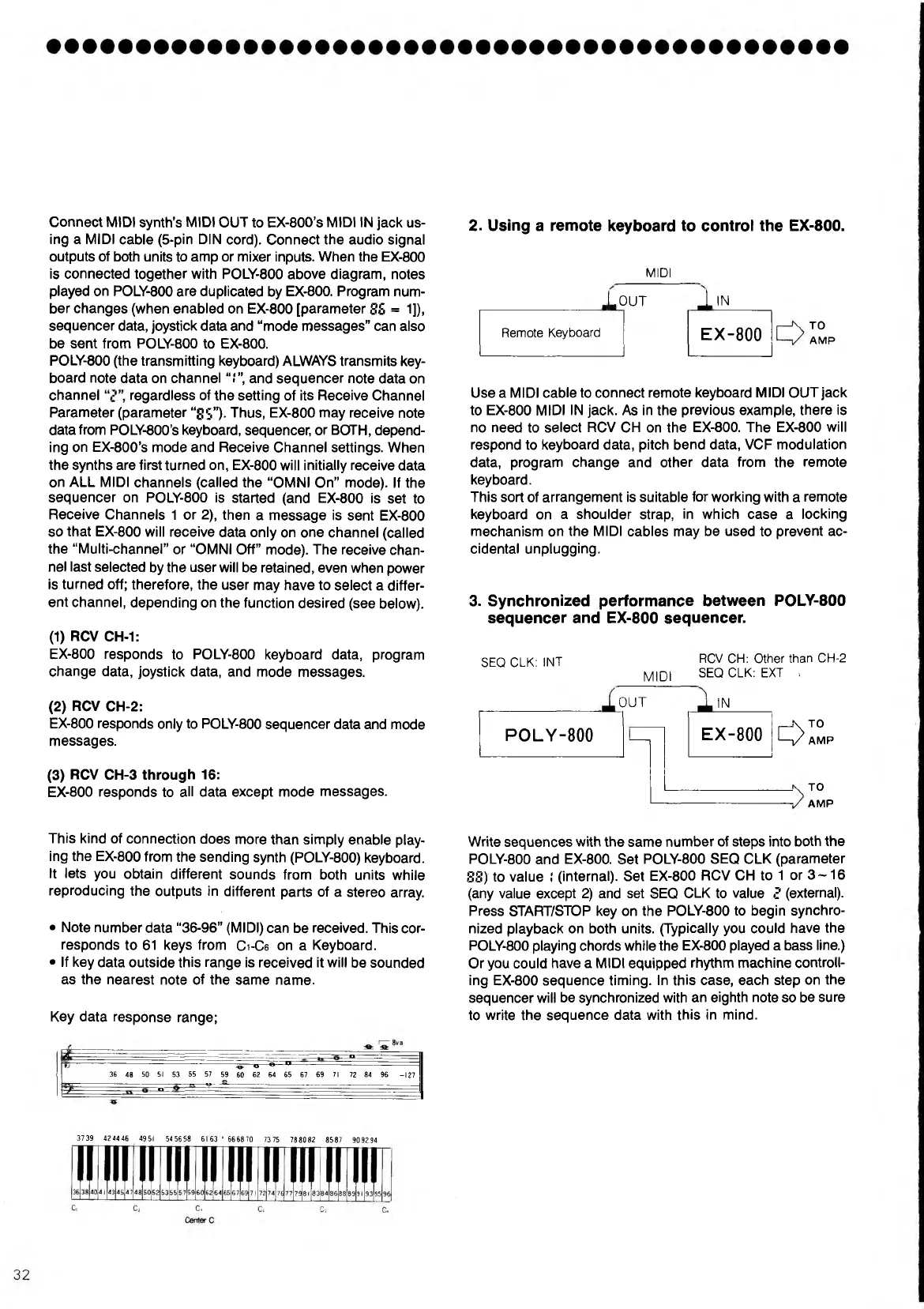Connect MIDI synth’s MIDI OUT to EX-800’s MIDI IN jack us
ing a MIDI cable (5-pin DIN cord). Connect the audio signal
outputs of both units to amp or mixer inputs. When the EX-800
is connected together with POLY-8OO above diagram, notes
played on POLY-8OO are duplicated by EX-800. Program num
ber changes (when enabled on EX-800 [parameter 85 = 1]),
sequencer data, joystick data and “mode messages” can also
be sent from POLY-8OO to EX-800.
POLY-8OO (the transmitting keyboard) ALWAYS transmits key
board note data on channel “I”, and sequencer note data on
channel regardless of the setting of its Receive Channel
Parameter (parameter “85”). Thus, EX-800 may receive note
data from POLY-800’s keyboard, sequencer, or BOTH, depend
ing on EX-800’s mode and Receive Channel settings. When
the synths are first turned on, EX-800 will initially receive data
on ALL MIDI channels (called the “OMNI On” mode). If the
sequencer on POLY-800 is started (and EX-800 is set to
Receive Channels 1 or 2), then a message is sent EX-800
so that EX-800 will receive data only on one channel (called
the “Multi-channel” or “OMNI Off” mode). The receive chan
nel last selected by the user will be retained, even when power
is turned off; therefore, the user may have to select a differ
ent channel, depending on the function desired (see below).
(1) RCV CH-1:
EX-800 responds to POLY-8OO keyboard data, program
change data, joystick data, and mode messages.
(2) RCV CH-2:
EX-800 responds only to POLY-8OO sequencer data and mode
messages.
(3) RCV CH-3 through 16:
EX-800 responds to all data except mode messages.
2. Using a remote keyboard to control the EX-800.
MIDI
,OUT
Remote Keyboard
IN
EX-800
TO
AMP
Use a MIDI cable to connect remote keyboard MIDI OUT jack
to EX-800 MIDI IN jack. As in the previous example, there is
no need to select RCV CH on the EX-800. The EX-800 will
respond to keyboard data, pitch bend data, VCF modulation
data, program change and other data from the remote
keyboard.
This sort of arrangement is suitable for working with a remote
keyboard on a shoulder strap, in which case a locking
mechanism on the MIDI cables may be used to prevent ac
cidental unplugging.
3. Synchronized performance between POLY-800
sequencer and EX-800 sequencer.
SEQ CLK: INT
RCV CH: Other than CH-2
M |D| SEQ CLK: EXT ,
OUT
IN
PQLY-800
EX-800
O
TO
AMP
TO
AMP
This kind of connection does more than simply enable play
ing the EX-800 from the sending synth (POLY-800) keyboard.
It lets you obtain different sounds from both units while
reproducing the outputs in different parts of a stereo array.
• Note number data “36-96” (MIDI) can be received. This cor
responds to 61 keys from Ci-Cs on a Keyboard.
• If key data outside this range is received it will be sounded
as the nearest note of the same name.
Key data response range;
= r =
-----
----------------------------------------
-------
,— Q U ...V
__
36 48 50 51
« o ° — u --------------------------------------------------------------
53 55 57 59 60 62 64 65 67 69 71 72 84 96 -12 7
- ii . o " — — 1
-------------
--
— -------------
-------------------------------------
Write sequences with the same number of steps into both the
POLY-8OO and EX-800. Set POLY-800 SEQ CLK (parameter
88) to value ! (internal). Set EX-800 RCV CH to 1 or 3 -16
(any value except 2) and set SEQ CLK to value 2 (external).
Press START/STOP key on the POLY-800 to begin synchro
nized playback on both units. (Typically you could have the
POLY-800 playing chords while the EX-800 played a bass line.)
Or you could have a MIDI equipped rhythm machine controll
ing EX-800 sequence timing. In this case, each step on the
sequencer will be synchronized with an eighth note so be sure
to write the sequence data with this in mind.
37 39 4 244 46 4 95I 5 456 58 61 63 * 666 87 0 7375 7 88 08 2 85 87 90 929 4

